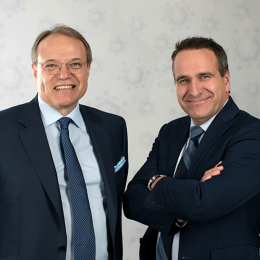Strategies for raising financially competent children, Part 2
"I’m in favor of giving my children enough money that they can do anything but not so much that they could do nothing."
Warren Buffett
by Mike Jaczko and Max Beairsto
Read Part 1
Over the past year, the world has continued to suffer through a global pandemic. Many of our pharmacy owner families remain worried about the impact and implications of the crisis on the next generation.
NURTURING FINANCIAL COMPETENCE
Once you have updated your family value statement and have a grasp of some agreed upon financial values, you may still have challenges to overcome.
Most pharmacy business owner families face a plethora of competing demands and struggle with the pressure of fitting everything into their day. Even if you want to raise financially competent kids, you still need to pay attention to their homework, nurture their musical talents and coach them on the soccer pitch. Employing the old adage that it takes a village to raise a child, parents can create a network for the next generation of “money coaches” that will, over time, reinforce key ideas and manage expectations with your children. Whether family or friends, these coaches can play an important role in preparing the next generation without the baggage of “being the parent.”
Another challenge parents may encounter is that we remain a society of consumers. It is important to teach your kids media literacy. As society polarizes, it remains important to recognize our own bias and impress upon them the skills of analyzing messages and information for validity and bias.
The third most common challenge is technology. Debit cards, credit cards, email money transfers, etc. are lending a hand in the creation of a cashless culture and changing the perceived value of paper money and fiat currency. ATMs magically dispense money and, at a very early age, kids get the idea that money is limitless. To overcome these challenges, you may try reading your bank statement to your children or spend time openly discussing the value of money and how to earn a living. We recognize that such an exercise may be an uphill battle and financial institutions are intentionally removing paper from the client experience!
Nurturing financial competence is a lifelong process. Parents may want to start talking about finances early because learning about money is like learning a language – easier to acquire the earlier you begin. The key for nurturing financial independence is to build an understanding in your kids around the five pillars associated with basic financial management: save (delayed gratification); spend (consume responsibly); invest (relationship between time, money, risk and return); donate (use money to make a difference); and earn (make a living).
Family enterprise wealth can provide for and deeply enrich the lives of generations to follow. However, wealth in a family can also pose challenges to the family, as well as those who will receive it. Some families justifiably fear that the comfort of wealth will distort the values of their children and grandchildren.
Inheritance Challenges
- Sense of Entitlement: Parents and children may have very different opinions on whether their children should be entitled to their wealth. Although most families recognize the importance of legacy, some demand that their children adopt their values and that inheritances be earned by establishing strategic trusts that reward children for achieving certain milestones.
- Lump Sum Distributions or Extended Distributions: Many people are uncomfortable with the idea of leaving their children with a lump sum payment upon their death. Again, transferring assets to a trust that distributes money in increments can encourage adult children to develop independent means.
- By the Roots or By the Head: Figuring out how to divide the estate among descendants can cause tension. By way of example, if child #1 has three children and child #2 has one child, how should you distribute your wealth? By two equal pots or by four equal pots to your grandchildren? Again, parents should discuss the pros and cons of these distributions with their estate lawyer.
- Differing Needs: Often, parents believe that dividing assets equally is the only way to treat their children fairly. Many times, there are situations that might require parents to treat their children differently. These issues are very hard to resolve but must be thoughtfully discussed with both your advisor and children to ensure everyone understands the reasons behind the disposition for the wealth. Flexibility in the design of your estate plan is also important. Your family’s estate plan needs to be reviewed at least every five years and must be flexible enough to accommodate changing family circumstances.
Consider what portion of your wealth you want to give to charitable causes. Deciding how much to give to descendants versus how much to give to charity requires serious thought and consideration. Charitable giving can be a wonderful tool for promoting your family’s financial values and teaching basic financial skills. Strategic philanthropy is the process of becoming intentional about family giving (money and time) by investing in issues that articulate a family’s passions and are close to your heart. A family foundation or a donor advised fund offers children ongoing involvement in the financial affairs of the family and an understanding of how you can make a difference with your money. With privilege comes responsibility.
Mike Jaczko, BSc. Phm, RPh, CIM®, FEA, a pharmacist by background, is a portfolio manager, partner and member of KJ Harrison Investors, a Toronto-based private investment management firm servicing individuals and families across Canada. For more information on this topic, email [email protected].
Max Beairsto, B.Sc. Pharm., MBA, CVA is a pharmacist and valuation analyst with Enterprise Valuators Corporation (EVCOR), an Edmonton-based business valuation firm that focuses on business valuations and sale advisory of small and mid-sized private companies. You can reach him at [email protected]




